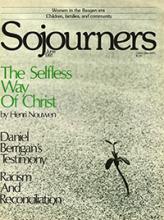For five years I have been working in the black community in Washington, D.C. As a white minister and representative of a predominantly white Protestant denomination, and without former relationships with black people, I have been made constantly aware of race issues during these years. Because of this, opportunities have come to speak to white audiences about the black experience in this country, and I have conducted seminars on the subject of racism and reconciliation.
I have a problem, though, which I believe is shared by other whites who like myself have opportunity to enjoy inter-racial fellowship, particularly in the context of the Christian church. My problem surfaces nearly every day, certainly whenever I read U.S. history of race relations or consider the continuing white supremacist attitudes which prevail in our society.
My problem is guilt. It doesn't take much talking, reading, or reflecting to bring it to the surface. At times I'm immobilized by it. I ask myself, what right does a white minister have to say anything to black people after all that has happened in our country with the blessing of white Christianity? Some have said to me rather directly that there is nothing I can or should try to say; now is not the time for whites to be talking to black people about getting themselves together. I agree. When I think of my own heritage I can only wish for forgiveness and grace.
I have deliberately immersed myself in experiences which would help me understand, at both intellectual and emotional levels, the black experience in the United States. I have taken steps, however timid and uncertain, to be among those who could help me uncover my own racism and inform me of what the world looks like from another point of view. The more I read, the more I experience, the more overwhelming are the feelings of guilt. Yet, in the midst of it I've found grace from those who have every right to separate themselves from me.
Read the Full Article

